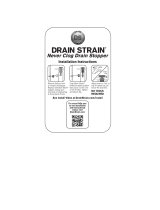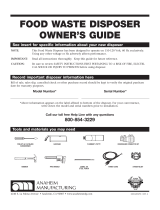
98
Electrical Connections
Wiring Disposer Directly to
House Current
1. Connect disposer to 110-120 Volt, 60Hz
AC current only.
2. If plug-in cord is used, use a three prong
plug (see A). Ground wire should be
attached to the ground screw in the
bottom of the end bell (see B).
3. Use a cable clamp strain relief connector
where the power cord enters the
disposer (see C).
This appliance must be connected to a
grounded, metal permanent wiring system or
an equipment grounding conductor must be
run with the circuit conductors and connected
to the equipment-grounding terminator or
lead on the appliance.
A. If you use BX cable:
1. Install cable connector in hole.
2. Connect white wire to white lead of
disposer.
3. Connect black.
4. Connect bare ground.
If BX cable is not used, provide a separate
ground wire to nearest cold water metal pipe
or other suitable ground, using the screw in
the bottom of the end bell for the ground wire
(see C).
B. If your power supply does not include a
ground wire, you must provide one unless
metal cable is used. Attach a copper wire
securely to disposer ground screw and attach
other end of wire to a metal cold water pipe.
Use only UL approved ground clamp. If
plastic pipe is used in your home, a qualied
electrician should install a proper ground.
Grounding Instructions
For Waste Disposers equipped with a
grounded plug-in power cord
This appliance must be grounded. In the
event of a malfunction or breakdown,
grounding provides a path of least
resistance for electric current to reduce
the risk of electric shock. This appliance
is equipped with a cord having an
equipment-grounding conductor and
a grounding plug. The plug must be
plugged into an appropriate outlet that
is properly installed and grounded in
accordance with all local codes and
ordinances.
For Waste Disposers not equipped with
a grounded plug-in power cord
This appliance must be grounded. In the
event of a malfunction or breakdown,
grounding provides a path of least
resistance for electric current to reduce
the risk of electric shock. The power cord
(to be installed) must have an equipment-
grounding conductor and a grounding
plug. The plug must be plugged into
an appropriate outlet that is properly
installed and grounded in accordance
with all local codes and ordinances.
Disconnect electric power to disposer
circuit before installation. Turn the
circuit breaker to the OFF position or
remove the fuse.
Connecting Disposer to a Plug-In
Cord
TO HOUSE
CURRENT OR
POWER CORD
WIRE NUTS
GROUND SCREW
STRAIN
RELIEF
NUT
A
CB
RED RESET BUTTON
RIBBED SIDE
NOTE: When viewing face of el
ec
tical
plug with grounding pin
at top,
the larger left blade is connected to
the identified wire .
Trace lead connected to this blad
e
and attach that lead to white wire
on disposer .
REMOVE COVER
PLATE
















